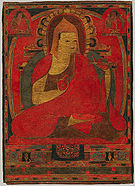- Ikhtiyar Uddin Muhammad bin Bakhtiyar Khilji
-
Part of a series on the History of Bengal 
Ancient Bengal Vedic Period Ancient Bengali States
Gangaridai Kingdom, Vanga Kingdom,
Pundra Kingdom, Suhma Kingdom,
Anga Kingdom, Harikela KingdomMauryan Period Classical Bengal The Classical Age Shashanka Age of Empires
Pala Empire, Sena EmpireMedieval Bengal Arrival of Islam
Sultanate of Bengal, Deva Kingdom
Bakhtiyar Khilji, Raja GaneshaMughal Period
Pratap Aditya, Raja Sitaram Ray
Nawab of Bengal, Baro-BhuyansModern Bengal Company Raj
Zamindari system, Bengal famine of 1770British Indian Empire
Bengal Renaissance
Brahmo Samaj
Swami Vivekananda, Jagadish Chandra Bose,
Rabindranath Tagore, Subhash Chandra BosePost-Colonial
1947 Partition of Bengal, Bangladesh Liberation War
Sheikh Mujibur Rahman, Jyoti BasuSee Also Bangladesh, West Bengal Ikhtiyar Uddin Muhammad bin Bakhtiyar Khilji (Bengali: ইখতিয়ার উদ্দিন মুহম্মদ বিন বখতিয়ার খিলজী, Persian: اختيار الدين محمد بن بختيار الخلجي), also known as Malik Ghazi Ikhtiyaru 'l-Din Muhammad Bakhtiyar Khilji. He was a Turkic military general of Qutb-ud-din Aybak.
Contents
Early life
IIkhtiyar Uddin Muhammad bin Bakhtiyar Khilji, also known as Malik Ghazi Ikhtiyaru 'l-Din Muhammad Bakhtiyar Khilji, a member of the Turkic Khilji tribe, who was head of the militant group that conquered much of northeastern India.
Rise
Khalji came from the town of Garmsir in southern Afghanistan. Tradition has it that Khalji's conquest of the Bengal at the head of 18 horsemen was foretold. It is held[by whom?] that he was of common birth, had long arms extending below his knees, a short physical stature and an unfavorable countenance. He was first appointed as the Dewan-i-Ard at Ghor. Then he approached India in about the year 1193 and tried to enter in the army of Qutb-al-Din. Then he went further eastward and took a job under Maklik Hizbar al-Din who was then the commander of the militant group of Badayun in northern India. After a short period he went to Oudh where Malik Husam al-Din, recognized him for his worth. Husam gave a landed estate in the south-eastern corner of modern Mirzapur district. Khilji gathered some Muslims under his banner and soon consolidated his position, carrying out raids into neighboring territories.[citation needed]
Conquests
Khalji's career took flight with a campaign which subjugated Bihar in 1203. This effort earned him political clout in the court at Delhi. The next year he took his forces into Bengal. As he came upon the city of Nabadwip, it is said that he advanced so rapidly that only 18 horsemen from his army could keep up. Khalji went on to capture the capital Gaur and intrude much of Bengal. He was also responsible for the barbaric destruction of Nalanda, which was an ancient center of learning in India.
Death
Khilji started his attack into Tibet from the town of Devkot in 1206 A.D. He left Ali Mardan Khilji in Ghoraghat Upazila to watch the eastern frontier from his headquarters at Barisal. The Tibet expedition ended and Bakhtiyar Khilji was assassinated by Ali Mardan Khilji while he was lying ill at Devkot on his return from the Tibet expedition (1206).
Legacy
Bangladeshi poet Al Mahmud composed a book of poetry titled Bakhtiyarer Ghora meaning Horses of Bakhtiyar in early 1990s depicting Khilji as the praiseworthy figurehead of conquest of Bengal. It was under Bakhtiyar Khilji's reign that Muslim missionaries in India achieved their greatest success, in terms of number of converts to Islam.[1] Muhammad Bakhtiyar Khalji had the Khutbah read and coins struck in his own name. Mosques, madrasas and Khanqahs arose in the new abode of Islam through Bakhtiyar's beneficence, and his example was worthily imitated by his Amirs.
Preceded by
Sena dynasty
King Lakshman SenKhilji Dynasty of Bengal
1204-1206Succeeded by
Muhammad Shiran KhiljiSee also
References
- ^ The preaching of Islam: a history of the propagation of the Muslim faith By Sir Thomas Walker Arnold, pg. 227-228
External links
- Sir Jadunath Sarkar, History of Bengal, II (Dhaka, 1948)
- History of the Muslims of Bengal - Volume 1A: Muslim Rule in Bengal (600-170/1203-1757), By- Muhammad Mohar Ali, Imam Muhammad ibn Saud Islamic University, Department of Culture and Publications.
- Bakhtiyar Khalji, Banglapedia
- Sena Dynasty, Banglapedia
Categories:- Delhi Sultanate
- History of Bengal
- History of Bangladesh
- History of medieval India
- Rulers of Bengal
- People in the history of Pakistan
- 1206 deaths
Wikimedia Foundation. 2010.
